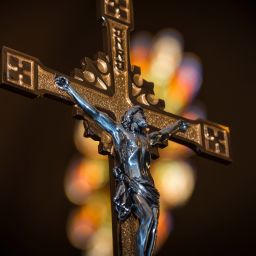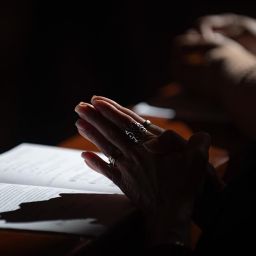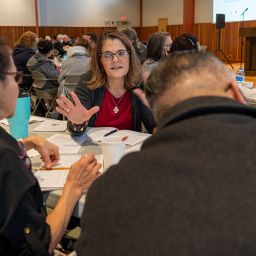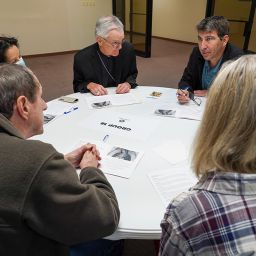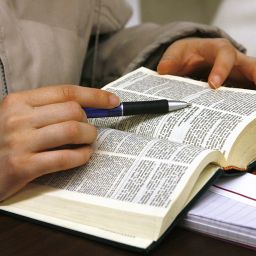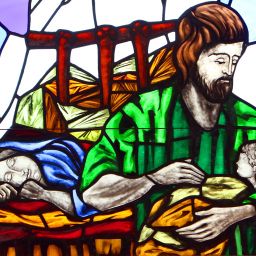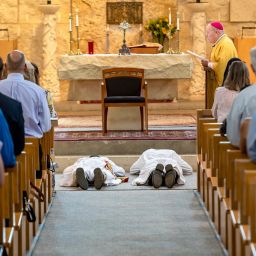By Father John Bayer
Special to The Texas Catholic
As a member of the synod preparatory commission, one of the exciting things I have seen is the synergy between clergy and laity in our diocese. Of course, we are still a pilgrim people, and the data we received from the listening sessions shows the need for further growth. Nonetheless, it has been beautiful, as a priest, to work shoulder to shoulder with so many dedicated lay people and priests on the commission and elsewhere, all of us wanting to try our best to give ourselves away for the good of the Church.
Priests bear a unique role in the Church, since they stand “in the person of Christ the head” and therefore uniquely communicate his presence and authority, especially when they celebrate the sacraments (CCC 1548-1550). God wants to remain present to his people through a real, historical body; and that body is, thanks be to God, easily identifiable through the concrete continuity of the ministerial priesthood stretching all the way back to the Apostles. But priests are not the only role in the Church! In fact, their role is essentially defined as a ministerial role, that is, a role in special service of other roles (CCC 1551), and so we should expect priests, when they are working at their best, to enable the lay faithful to discern their gifts from the Spirit and give themselves away in love.
My impression is that Bishop Edward J. Burns is trying to do just that. He wants our diocesan synod to catalyze many wonderful things — and one of those is to energize the faithful, including the next generation of lay leaders, to step up and share in the mission of the Church. As we gear up for the synod in 2024, and for the many years of hard but wonderful work that will come afterward, it is important to think about what those lay leaders will look like. One of them, Lacy de la Garza, who is already at work as chair of the synod preparatory commission, has spent a lot of time thinking about this. Drawing upon her own observations and conversations with Bishop Burns, she has identified “three pillars” for successful leadership.
The first is that a leader “has to take responsibility for when things go right and when things go wrong.” When things go wrong, it is tempting to blame others rather than examine ourselves. With the synod process, Bishop Burns is modeling for us a healthy sense of responsibility by opening himself to hearing everything through the 30 listening sessions that have now taken place. Let us have a similar sense of self-examination and responsibility. When things go wrong, it is not necessarily the result of some failure in the offices and ministries of our diocese, though it certainly could be. Sometimes, the problem could be that the people God is calling to inject new resources and energy have not yet risen to the occasion. Let us all feel responsible for what is happening in our local church and ask God to help us find our role in building it up!
The second is that a leader “must be open to a spirit of community.” If we want to cooperate with the Holy Spirit, we must be ready to work for the good of the community (cf. Eph 4:7-16; 1 Cor 12:4-7). This means we must in so many ways — so many sanctifying ways — let go of our egos. We should not try to do everything on our own. If we have a good idea, we should not assume we have all the pieces necessary to carry it out. We must pay attention to our lack of skills in certain areas that are needed to bring the idea to life. Moreover, we should accept that perhaps our idea already exists in the community: God might be calling us not to establish a competing structure but to support one already in existence.
Finally, good leaders will want “to benefit the community, not themselves.” Sometimes, when we see weakness in the community, we can be tempted to exalt ourselves as individuals by harshly criticizing what needs to be improved. But when Jesus criticized others, like the Scribes and Pharisees, he never stopped working for their good. He continued to engage them. Still today, he humbly stands with us in our weakness and invests in the arduous work of bringing about true growth. A true leader will want to help our pilgrim diocese; rather than scorning from the sidelines, he will enter the fray and work for the good.
If you want to think more on this topic, check out Lacy de la Garza’s own article on the topic at www.cathdal.org/synod. If you want some profound and inspiring reading on the vocation of the lay faithful, check out “Christifideles laici” by St. John Paul II!
Father John Bayer, O. Cist., is a monk at the Cistercian Abbey of Our Lady of Dallas in Irving.



